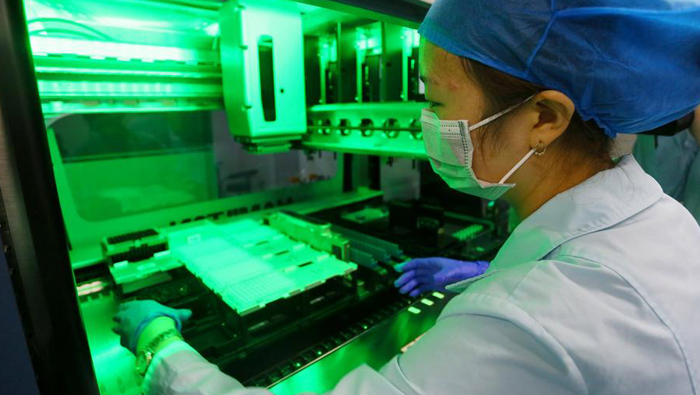- International News
- Thu-2020-12-31 | 01:22 pm

China announced the approval of
its first COVID-19 vaccine on Thursday. The vaccine has been developed
by state-owned pharmaceutical company Sinopharm.
The approval of the inactivated, two-dose vaccine comes a day after Sinopharm said it was found to be 79.3 per cent effective in initial data from the final phase of testing.
China plans to vaccinate up to 50 million people ahead of the Lunar New Year holiday in February, in order to prevent the virus from spreading during the festivities.
Sinopharm is among the Chinese developers that are in a global race to create vaccines to beat the coronavirus pandemic, which has claimed close to 1.8 million lives around the world.
Meanwhile, December 31 marks exactly a year since DW first reported on the emergence of a mystery flu-like virus in China. Here's a look at what happened next.
Europe
In her New Year's speech on Thursday, Germany's chancellor Angela Merkel said the "historic" coronavirus crisis will extend into the coming year even if the vaccines bring some promise.
She slammed the conspiracy theories advanced by COVID-19 sceptics as false and dangerous, adding that they were also cynical and cruel towards the people who have suffered during the pandemic.
Germany on Thursday reported 32,552 new cases of coronavirus infections pushing the total tally to over 1.7 million cases.
According to the latest figures from the Robert Koch Institute (RKI) for infectious diseases, the death toll increased by 964 to 33,071.
Germany's Health Minister Jens Spahn said this week that he can see no end in sight for the nationwide lockdown.
Americas
The United States recorded its highest ever death toll from COVID-19 on Wednesday with over 3,900 new deaths
The new figures come at a time when health workers in the country are preparing for a spike in the caseload after holiday gatherings.
The US is the worst-affected country in the world with more than 19.7 million infections and 341,000 deaths.
Mexico has initiated a probe into allegations of abuse of power by a family to obtain shots of the COVID-19 vaccine, President Andres Manuel Lopez Obrador said on Wednesday.
The incident allegedly took place in a hospital in a western municipality of the capital and involves a doctor and his family, the president told the media.
He urged people to report potential abuses in the country’s vaccine rollout.
Mexico began its inoculation process with the first few thousand of the BioNTech-Pfizer vaccine last week.
The country is helping to produce the Oxford University-AstraZeneca vaccine and has agreements to receive doses starting March.
In its first major vaccine deal, Bolivia has reached an agreement with Russia for doses of the Sputnik V vaccine.
The Russia Direct Investment Fund (RDIF) on Wednesday agreed to supply Bolivia with enough of its two-dose vaccine to vaccinate 2.6 million people.
The South American nation, which also battled political and social instability alongside the pandemic, has been struggling to secure bilateral vaccine deals.
The government is looking to vaccinate up to 20% of its population in the first quarter of 2021 as part of the World Health Organization's COVAX initiative, which is aimed at ensuring the equitable distribution of vaccines.
Brazil, meanwhile, is at the risk of not having enough syringes to roll out its vaccines.
The country's syringe and needle makers on Wednesday cautioned that the vaccination plan was in jeopardy as the government set auction prices too low and failed to draw bids for enough syringes.
The Health Ministry had set out to buy 331 million syringes at an auction on Tuesday but purchased just 8 million after it set reference prices below the bids of the companies involved.













